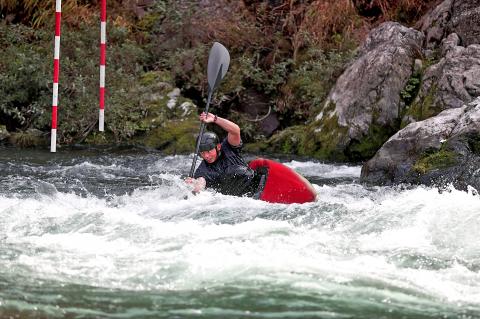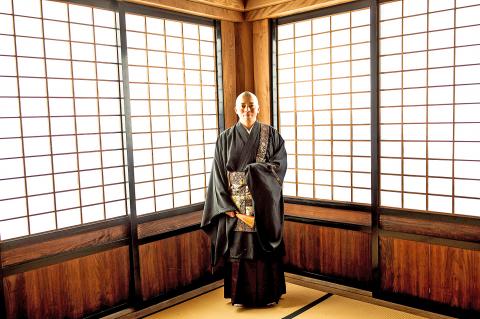Rising silently before dawn to slip on his monastic robes and begin the solemn duties of a Buddhist monk, Kazuki Yazawa is not your average Olympic athlete.
Bowing his shaved head in prayer five times a day at the ancient Zenkoji Daikanjin Temple, Yazawa is so committed to his faith very few people would recognize him as Japan’s top canoeist.
But Yazawa, who finished 11th in the men’s kayak slalom at the Rio Olympics earlier this year, is contemplating the holy grail of the 2020 Tokyo Games.

Photo: AFP
“Of course I want to compete in Tokyo,” the 27-year-old said in an interview as the early morning sun crept above the roof of his temple in Nagano prefecture.
“It will be the only chance in my life to compete at an Olympics in Japan,” added Yazawa, who also represented his country at the Beijing and London Games.
“But it’s pretty hard to win an Olympic medal if you also happen to be a monk. To set your heart on winning a medal, you have to be completely focused. Otherwise it’s impossible,” he said.

Photo: AFP
Still getting to grips with the priesthood’s austere way of life, Yazawa squeezes in kayak training each afternoon, pulling on a T-shirt and shorts before hurtling down a nearby river at breakneck speed.
The fun-loving priest, who frequently posts grinning selfies on Instagram, flirted with retirement after a Japanese record ninth-place finish at the 2012 London Olympics as his thoughts turned to finding a steady job for the future.
ROOM WITH A PEW
Instead he was persuaded to swap his life as an athlete on the professional circuit for a room with a pew.
“I didn’t have an epiphany — I simply wasn’t interested in becoming a priest,” said Yazawa, who took the advice of the local canoe federation boss Kenei Koyama, himself a priest.
“[But] I really looked up to my teacher [Koyama] and wanted to become like him, someone who will be there to help people,” he said, adding, “Obviously now I don’t have enough time for my kayak training but I get to enjoy the sport in its purest form. I still want to win though. That hasn’t changed.”
Yazawa, whose younger sister Aki also qualified for Rio, admits his second calling got off to a difficult start.
“The first two months of monastic training were in the mountains,” he said. “You wake up at 2am and study until 10am, sat with your legs crossed the whole time. The food is very basic and you have to do the cleaning. It’s tough.”
But while Yazawa can no longer spend as much time in the gym or on the water, he believes he does have divine support.
“I don’t feel that because I’m a priest my kayak goes any faster,” he smiles. “But I do feel that the Buddha is protecting me. You must have a goal and dedicate yourself to it. If you do that, then it’s in the last split-second where Buddha will help you,” added Yazawa, who last month captured the Japan Cup.
HOLY WATER
Yazawa says his faith helps make him a better canoeist.
“I don’t do anything particularly religious before I get into the canoe,” he said. “But I believe if I focus hard enough, the Buddha will give me a gentle push on the water.”
His senior monks woke up in the middle of the night to watch live streaming of Yazawa’s races in Rio, further supporting him with text messages and Skype calls.
“We all want him to win a medal at the Tokyo Olympics,” said priest Shinjun Denda. “We will all be cajoling him and pushing him to compete.”
For now religion comes first for Yazawa, who insists he wants to race on his own terms.
“I don’t want to have any regrets,” he said, sitting in front of the temple’s grand altar.
“When you come to a place like this you feel your heart relax. It helps control your feelings when you’re competing under pressure. But if you don’t control your own thoughts, you won’t get any help from above,” he said.

June 23 to June 29 After capturing the walled city of Hsinchu on June 22, 1895, the Japanese hoped to quickly push south and seize control of Taiwan’s entire west coast — but their advance was stalled for more than a month. Not only did local Hakka fighters continue to cause them headaches, resistance forces even attempted to retake the city three times. “We had planned to occupy Anping (Tainan) and Takao (Kaohsiung) as soon as possible, but ever since we took Hsinchu, nearby bandits proclaiming to be ‘righteous people’ (義民) have been destroying train tracks and electrical cables, and gathering in villages

Dr. Y. Tony Yang, Associate Dean of Health Policy and Population Science at George Washington University, argued last week in a piece for the Taipei Times about former president Ma Ying-jeou (馬英九) leading a student delegation to the People’s Republic of China (PRC) that, “The real question is not whether Ma’s visit helps or hurts Taiwan — it is why Taiwan lacks a sophisticated, multi-track approach to one of the most complex geopolitical relationships in the world” (“Ma’s Visit, DPP’s Blind Spot,” June 18, page 8). Yang contends that the Democratic Progressive Party (DPP) has a blind spot: “By treating any

Swooping low over the banks of a Nile River tributary, an aid flight run by retired American military officers released a stream of food-stuffed sacks over a town emptied by fighting in South Sudan, a country wracked by conflict. Last week’s air drop was the latest in a controversial development — private contracting firms led by former US intelligence officers and military veterans delivering aid to some of the world’s deadliest conflict zones, in operations organized with governments that are combatants in the conflicts. The moves are roiling the global aid community, which warns of a more militarized, politicized and profit-seeking trend

This year will go down in the history books. Taiwan faces enormous turmoil and uncertainty in the coming months. Which political parties are in a good position to handle big changes? All of the main parties are beset with challenges. Taking stock, this column examined the Taiwan People’s Party (TPP) (“Huang Kuo-chang’s choking the life out of the TPP,” May 28, page 12), the Democratic Progressive Party (DPP) (“Challenges amid choppy waters for the DPP,” June 14, page 12) and the Chinese Nationalist Party (KMT) (“KMT struggles to seize opportunities as ‘interesting times’ loom,” June 20, page 11). Times like these can